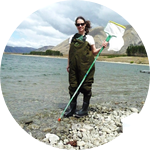About This Project
We will explore how low-level steroid exposure can have long-term, population-scale consequences for aquatic ecosystems. We will address this question by quantifying how exposure of female freshwater snails to potent steroid pharmaceuticals affects reproduction in the offspring of the exposed snails. This research will benefit society by illuminating under-appreciated yet important consequences of steroid exposure for aquatic organisms.
Ask the Scientists
Join The DiscussionWhat is the context of this research?
Low-level environmental exposures to steroidal pharmaceuticals is likely inevitable for aquatic organisms. While it is clear that these chemicals affect directly exposed organisms, how the offspring of these organisms are themselves affected is unknown.
How these '"transgenerational" effects cascade from parent to offspring is a critical step towards understanding and mitigating the negative consequences of environmental pollution.
What is the significance of this project?
Transgenerational effects of steroid exposure will have population-level consequences for food webs, ecosystem function, and possibly, human health. Despite the certain occurrence of steroid pharmaceuticals in the environment, limited to no data exist regarding how exposure of parents to these chemicals influences later generations - even if exposures are limited to only one generation.
Our research will help to address this critical knowledge gap by using a powerful and appropriate freshwater snail model system to evaluate whether and to what extent parental steroid exposure influences reproductive health in offspring.
What are the goals of the project?
Our immediate goal is to quantify, via standard assays of reproductive activity, how steroid hormone exposure influences reproduction in the offspring of exposed individuals. We will assay both androgenic and estrogenic steroids that are commonly used in industry and agriculture.
Budget
The proposed research represents an exciting new collaboration between established experts in the very different fields of evolutionary biology (Neiman) and environmental science (Cwiertny). New and exciting projects need a small amount of initial support to get off the ground. Successful execution of the proposed research will require materials (e.g., steroids, snail containers) and support for the undergraduate researchers that will run the project.
Meet the Team
Team Bio
Maurine Neiman is an evolutionary biologist and Associate Professor in the Department of Biology at the University of Iowa. Her main research interest is in solving the paradox of sexual reproduction: why so many organisms reproduce sexually when asexual reproduction is much simpler and less costly. She is very excited about the project proposed here because it allows her to use her expertise and her snail system to directly address real-world projects.David Cwiertny is an Associate Professor of Civil and Environmental Engineering at the University of Iowa. His research group broadly focuses on pollutant fate in natural and engineered systems, with particular emphasis on emerging pollutant classes and their bioactive transformation products.
Lab Notes
Nothing posted yet.
Press and Media
Maurine Neiman shows "Goldilock" effect in snails..
Neiman asks why organisms use sex..
Neiman discusses Darwin with Sean Carroll on Iowa Public Radio!
High school students in the Neiman lab!
Integrating art and science in the Neiman lab
Neiman contributes to book on zombies!
Asexual snails suffer from the absence of sex
Trenbolone "the vampire steroid" in Discover Magazine
David chats with Science Magazine about current water resource challenges
Project Backers
- 0Backers
- 0%Funded
- $0Total Donations
- $0Average Donation

